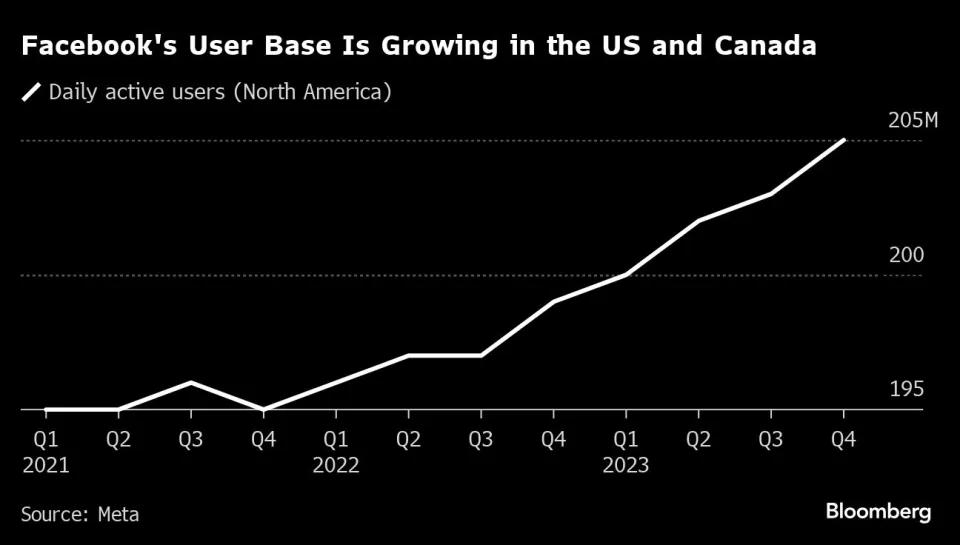
Meta Revamped Facebook’s Feed to Fend off TikTok, Win Back Younger Users
(Bloomberg) — Facebook parent Meta Platforms Inc. has spent the last several years overhauling its flagship social networking app, tweaking people’s feeds to feature a broader array of posts and videos in an effort to stave off competition from TikTok and win back younger users.
In late 2021, TikTok was on the rise, Facebook interactions were declining after a pandemic boom and young people were leaving the social network in droves. Chief Executive Officer Mark Zuckerberg assembled a handful of veterans who’d built their careers on the Big Blue app to figure out how to stop the bleeding, including head of product Chris Cox, Instagram boss Adam Mosseri, WhatsApp lead Will Cathcart and head of Facebook, Tom Alison.
During discussions that spanned several meetings, a private WhatsApp group, and an eventual presentation at Zuckerberg’s house in Palo Alto, California, the group came to a decision: The best way to revive Facebook’s status as an online destination for young people was to start serving up more content from outside a person’s network of friends and family.
Just over two years later, the shift has shown signs of success. Facebook’s user base in the US and Canada — the most important markets for the company’s core advertising business — is suddenly growing again after years of stagnation. Young adults in those markets are using Facebook more than they have in years, and advertising revenue continues to rise.
Meta’s move was precipitated by the TikTok juggernaut. The short-form video app owned by China’s ByteDance Ltd., exploded in popularity around 2020 by serving up an addictive stream of personalized content based on a user’s interests and preferences. Facebook, by contrast, had largely relied on users’ online connections – the friends and family that made up their “social graph” – to determine what posts people saw.
As TikTok occupied ever more attention amid the younger crowd, Meta’s top brass decided in late 2021 that Facebook needed to do something similar and began building new “recommendation” algorithms. It was a notable departure from the “social graph” strategy that had defined Facebook’s service for nearly two decades.
‘Threshold Decision’
“This did feel very much like one of those threshold decisions,” said Alison, who still runs the Facebook app. “It was scary because there was always this underlying fear of — if you go in that direction, do you walk away from your social heritage? Does a lot of the social activity on the site that makes it what it is, does that go away as well?”
But Meta took the plunge and made “recommendations” a core part of its product strategy. Its top priority for deploying the new algorithm was initially in Reels, a TikTok clone that debuted on Instagram in 2020. Today, 50% of the content people see on Instagram is considered a “recommendation” from an AI algorithm.
The company also started pushing outside content within Facebook’s Feed toward the end of 2021, a significant decision considering the main social network was still the company’s most lucrative product. Making that change within a new product like Reels was an easy decision, but there was concern that tinkering with the flow of content in what used to be known as the News Feed could drive down Facebook usage or hurt Meta’s business.
That doesn’t seem to be the case, at least so far. Today, an average of 30% of the posts that people see in their Facebook Feed are suggestions from outside of their network, more than double the number from two years ago. Advertising revenue, meanwhile, was up 15% in 2023 compared with 2021.
Perhaps most surprisingly, Facebook is having a notable resurgence in user growth. Its audience in the US and Canada grew by 10 million people over 2022 and 2023. It didn’t add any net new users in 2021.
Facebook is even growing in popularity again with 18-to-29-year-olds, a demographic that had been on the decline for years. Pew Research found that 67% of US adults in that category used Facebook in 2023, down from 81% five years earlier. But the company’s flagship social network has seen five straight quarters of growth from daily active users in that age range in the US and Canada, a spokesperson said. It now has more than 40 million young adults using Facebook every day, its highest total in three years, the spokesperson added.
It’s a stark reversal that runs counter to the broader narrative around Facebook, that the flagship network is mostly for “older” people. It’s unclear if Feed changes are the main driver of that growth, but Meta executives are encouraged nonetheless. What’s materialized is not necessarily an abandonment of the friends and family mindset that made Facebook dominant for years, but rather a new level of comfort in straying from that strategy when necessary.
“If the first thing you see in your news feed – if the best thing for you in that moment is a recommendation – we should be able to show that to you,” Alison said. “We hadn’t quite wrapped our heads around that yet” in 2021.
Meta’s push toward “recommendations” may have been inspired by TikTok, but it was also made possible by recent advancements in artificial intelligence technology, company leaders say.
Showing people content related to their social circle typically means Meta’s algorithms need to rank content from a pool of, at most, a couple thousand posts. Pushing content to people from outside of their network, though, increases the pool of potential posts exponentially. Now, any of the billions of photos, links or videos on Facebook could theoretically be a fit for a given user, creating a more elaborate ranking challenge that the company is still perfecting.
In 2022, Meta engineers spent a lot of time and resources moving the new algorithms from CPU processors to more powerful — and expensive — GPU processors that can more quickly analyze greater volumes of data, Alison said. This strategy has also become a key talking point with investors.
“Our investments in developing increasingly advanced recommendation systems continue to drive incremental engagement on our platforms demonstrating that people are finding added value by discovering content from accounts they’re not connected to,” Chief Financial Officer Susan Li said on Meta’s latest earnings call. The company also told investors that it was increasing capital expenditures for the year, in part to spend more on AI.
Universal Recommendation Algorithm
This strategy has been a reversal of sorts from prior Feed changes. In 2018, Meta publicly updated Facebook’s algorithm to show more posts from friends and family at the expense of content from businesses and media organizations. Zuckerberg described it at the time as leaning in toward “meaningful social interactions.”
“Too often today, watching video, reading news or getting a page update is just a passive experience,” he wrote at the time.
Meta insists the company’s focus on “recommendations” isn’t an abandonment of friends and family content, but rather a new balance between the two. Alison said Meta has been careful to try and avoid a scenario where the things you see on Facebook are the exact same posts you can find anywhere else online.
“How do you lean into recommendations but then how do you still do that in a way that honors and takes advantage of our social heritage?” he said. “You could end up in a place where you just become commoditized, like you’re recommending the same stuff as everybody else. So we went through all those debates.”
Meta has plans to expand “recommendations” further. Right now, most of the company’s algorithms are product-specific – the algorithm for Feed is different than the one for Reels, which is different than the one for Facebook Marketplace, its Craigslist competitor.
But Meta is working on a more universal algorithm that could work across all its various features. In a perfect world, a user who visits Marketplace to buy an Instant Pot, for example, might then also see recommendations for cooking-related content within other products, like Groups or Reels.
“That is a big focus for us I would say this year,” Alison said. “If we are right, you’re going to have the Instant Pot experience much more frequently across many more products.”
文章来源:finance


TKFFF公众号
扫码关注领【TK运营地图】

TKFFF合作,请扫码联系!







 闽公网安备35021102002035号
闽公网安备35021102002035号